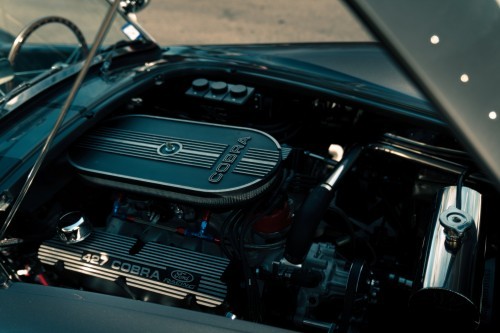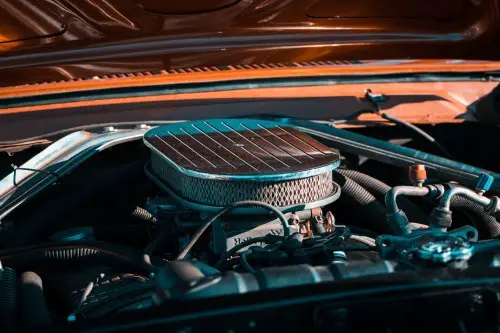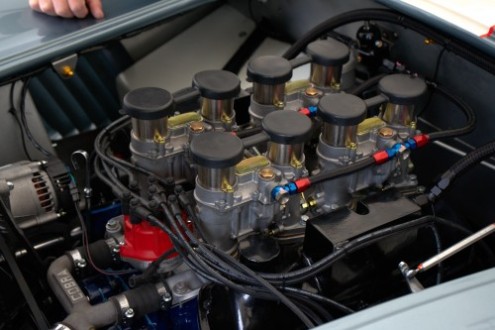The renowned German carmaker BMW has a long history of creating some of the most admired and sought-after V8 engines in the world. BMW’s V8 engines, which are renowned for their power and accuracy, have been instrumental in building the brand’s reputation for producing high-performance cars that provide an exciting driving experience.
The Iconic BMW V8 Engines:
Numerous legendary V8 engines from BMW have made an impression on the automotive industry. In addition to being the epitome of precise engineering, these engines have propelled some of the most renowned models in BMW’s legendary range. Let us examine some of the most well-known BMW V8 engines in more detail:
A. BMW M60 V8:
- Introduction: When BMW first entered the V8 engine market with the M60 V8, which debuted in the early 1990s, it was a revolutionary moment for the company.
- Key Specifications and Features: With its 295 lb.-ft of torque and about 282 horsepower, this 4.0-liter V8 was praised for its harmonious blend of power and refinement.

- Notable Models: BMW introduced the M60 engine to the 5 Series and 7 Series, among other vehicles, enhancing their performance and driving pleasure.
B. BMW N62 V8:
- Introduction: When the N62 V8 engine was unveiled in the early 2000s, it demonstrated BMW’s dedication to both performance and innovation.
- Key Specifications and Features: This engine, which came in several displacements, was able to generate a lot of power and included innovative features including Valvetronic technology.
- Notable Models: The N62 engine was used to power BMW vehicles such as the X5, 5 Series, and 7 Series, which improved their performance and status.
C. BMW S65 V8:
- Introduction: In the latter part of the 2000s, the S65 V8 engine was developed, mostly for BMW’s M high-performance division.
- Key Specifications and Features: With an astounding 414 horsepower and 295 lb.-ft of torque, this 4.0-liter V8 was a high-revving masterpiece that offered exhilarating acceleration and accuracy.
- NotableModels: The iconic E92 M3, renowned for its remarkable agility and seductive engine sound, was powered by the S65 engine.
D. BMW N63 V8:
- Introduction: BMW’s V8 portfolio was expanded more recently with the introduction of the N63 V8 engine in the late 2000s, which emphasizes power and innovative technology.
- Key Specifications and Features: It is available in a range of displacements and with two technologies such as Valvetronic and TwinPower Turbo, it generates impressive power.
- Notable Models: The powerful performance of the N63 engine has helped BMW’s 5 Series, 6 Series, 7 Series, and X5.

BMW N62 V8:
BMW built the highly respected V8 engine known as the N62 between 2001 and 2010. It is an engine from BMW’s N Series and was employed in several BMW cars while it was in production. The N62 engine stands out for its unique blend of efficiency, smoothness, and innovative technology. Key information on the BMW N62 V8 engine is as follows:
Key Specifications and Features:
- Displacement: Depending on the exact model and configuration, the N62 engine was offered with 3.6, 4.4, or 4.8 liters in displacement. BMW was able to provide a variety of power outputs to accommodate various models and performance levels as a result.
- Power Output: The N62 engine was renowned for producing a lot of power. For instance, the power output of the 4.4-liter variant might range from 286 to 372 horsepower, contingent upon the model and trim level.
- Torque: The N62 engine produced equally outstanding torque ratings, with some variations reaching torque levels of over 370 lb.-ft. This added to the engine’s impressive performance qualities by providing powerful low-end and mid-range power.
- Valvetronic Technology: BMW’s unique variable valve lift system, known as Valvetronic technology, was incorporated into the N62 engine. By modifying the lift and duration of the valve, Valvetronic enhances performance and fuel economy. It also helps the engine run more quietly and smoothly.
- Double VANOS: BMW’s Double VANOS (Variable Nockenwellensteuerung) system, which optimizes camshaft timing for increased economy and performance, was fitted to several N62 engines.
- Aluminum Block and Cylinder Heads: Lightweight aluminum was used to build the engine block and cylinder heads, which reduced total weight and enhanced engine balance.
Notable Models Powered by the N62 Engine:
The N62 engine found its way into several BMW models, including:
- BMW 7 Series: The 745i, 750i, and 760i BMW 7 Series models were powered by the N62, which provided the performance and luxury anticipated from this premium sedan.
- BMW 5 Series: A dynamic and upscale driving experience was offered by the engine, which was also utilized in various BMW 5 Series models.
- BMW X5: The N62 engine was mated to some BMW X5 SUV models, providing the practicality of an SUV with V8 power.
Performance:
- Impressive Power: The N62 V8 engine has a reputation for producing a lot of power. It is a powerful engine that can produce between 286 and 372 horsepower, depending on the model and configuration. This makes it suitable for a range of BMW vehicles.
- Torque-Rich: Another notable feature of the N62 engine was its exceptional torque output, which frequently exceeded 370 lb.-ft. This meant that the N62 engine offered rapid acceleration and plenty of overtaking power in BMW automobiles.
- Smooth Delivery: With its significant torque and smooth, linear power delivery made possible by the N62’s V8 design, driving was both snappy and easygoing. Its extraordinary smoothness was partly attributed to the engine’s natural balance and refinement.
- Acceleration: BMW is known for its dynamic and exciting driving experience, and the N62 engine made it possible for models to accelerate quickly, whether they were sporty sedans like the 5 Series or opulent flagships like the 7 Series.

Innovative Features:
- Valvetrain Technology: BMW’s Valvetrain technology was one of the N62 engine’s most notable characteristics. This new mechanism does away with the requirement for a conventional throttle body by precisely controlling the engine’s intake valve lift. In addition to increasing engine responsiveness, the valvetrain also reduced pollutants and increased fuel efficiency.
- Double VANOS: BMW’s Double VANOS system, which modifies the timing of the intake and exhaust camshafts, was often installed in the N62 engine. With this technique, valve overlap is optimized for increased power and economy over a range of engine speeds.
- Aluminum Construction: The engine’s overall weight was decreased in part by the cylinder heads and engine block being made of lightweight aluminum. The car performed better overall because of the increased agility and balance brought about by the weight decrease.
The Future of BMW V8 Engines:
The future of V8 engines, particularly BMW’s, is changing significantly as the automotive industry makes a big push towards electrification and sustainability. BMW is actively adjusting to these developments while attempting to keep up economy and performance. Here are some predictions regarding BMW V8 engines in the future:
- Hybridization and Electrification: Like many other automakers, BMW is expanding its inventory to include electric vehicles. Future BMW V8 engine development is related to hybrid technology. We anticipate seeing strong and effective hybrid powertrains made from V8 engines coupled with electric motors and batteries. This combo lowers emissions while improving performance.
- Mild Hybrid Systems: BMW will probably use mild hybrid systems, which rely on a 48-volt electrical architecture to support the V8 engine during acceleration and minimize fuel usage. The purpose of these systems is to increase efficiency without sacrificing functionality.
- Downsizing and Twin-Turbocharging: BMW may use twin-turbocharging to extract more power from smaller-displacement engines and shrink V8 engines to comply with increasingly stringent pollution laws without sacrificing performance. This method lowers emissions without compromising driving enjoyment.
- Performance-Oriented Electric Vehicles: With models like the BMW i4 and the completely electric BMW M5, BMW has previously dabbled in the world of electric performance cars. Future high-performance models could use more electric V8 powertrains, which would provide the quick torque and quiet operation of electric propulsion with the exhilaration of V8 engines.
Frequently Asked Questions (FAQs):
Which V8 BMW engine is the best?
The “best” BMW V8 engine is arbitrary and determined by many factors. That said, the BMW S65 V8, which powers the E92 M3, is often seen as one of the most famous BMW V8 engines because of its exhilarating exhaust sound, remarkable performance, and high-revving nature.
Which V8 BMW was trustworthy?
One of BMW’s most reliable V8 engines is the N62, which is well known for being dependable when properly maintained.
Which BMW is powered by a V8?
Over the years, several BMW models—including the high-performance M3, M5, and M6 variants—as well as the 3 Series, 5 Series, 7 Series, X5, and X6—have been powered by V8 engines.
Which V8 engine is the most well-known?
The BMW S65 V8 engine, which powers the E92 M3, is one of the most well-known V8 engines because of its remarkable performance and high revving limit.
Conclusion:
In summary, BMW’s V8 engines have long been associated with strength, accuracy, and fun driving. These engines, which power some of the most renowned and adored BMW cars, have irrevocably changed the face of automotive engineering. Every V8 engine, from the legendary M60 V8 to the forefront N62 and powerful S65, and the more contemporary N63, symbolizes a different period in BMW’s illustrious past.
The future of BMW V8 engines is a power-to-sustainability synergy where innovative engineering and materials to improve performance and efficiency coexist with hybrid powertrains and electric assistance.

